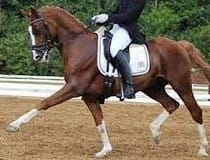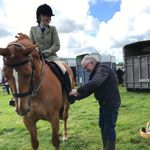Danish Equestrian Federation Ban Dressage Pony After Partial Tongue Amputation

Nørlunds Vincente, an internationally competed FEI dressage pony, has been found at the centre of a controversy that has led to a lifetime ban from Danish national competitions, according to the Disciplinary Committee of the Danish Equestrian Federation (DRF). The focal point of this ban is a contentious partial tongue amputation, which recently came to light through an exposé by TV 2. The allegations suggest that the procedure was not driven by medical necessity but rather as an attempt to mask underlying training issues.
The revelation has sparked widespread debate and concern within the equestrian community, shedding light on ethical considerations and practices that may compromise the welfare of the animals involved.
The sequence of events leading to Vincente's ban began with TV 2's disclosure of anonymized documents detailing the DRF's decision. While the documents were circulating internationally, TV 2 took the lead in uncovering the specifics of the case. The verdict date and the identities of those involved, including the pony, were intentionally omitted from the documents.
Vincente's partial tongue amputation became a subject of public scrutiny when TV 2 published an article on its website, detailing the procedure carried out on the 16-year-old Danish Riding pony by Verdi x Chamberlain. The report outlined that a previous owner had sent Vincente to an equine hospital, where veterinarian Palle Brink performed the amputation, removing the apex and partial blade of the tongue.
Brink argued that the procedure was medically necessary due to "infection and dead tissue in the tongue." However, the DRF's Disciplinary Committee has expressed scepticism, asserting that the intervention was not veterinary-professionally necessary for the pony's well-being but rather aimed at concealing pain and injuries, specifically to enhance the pony's performance in dressage competitions.
The controversy has brought to the forefront the ethical implications of interventions that may compromise the well-being of horses for the sake of competitive success. Mette Uldahl, DRF's veterinary consultant, emphasised the gravity of the situation, noting that the tongue is a vital organ for horses, playing a crucial role in eating, detecting feed, and communication with other horses.
The Danish Veterinary Association has responded to the situation, with Ginnie Holmes Hørning, head of the Working Group "Horse," stating that if a vet amputates part of a healthy tongue to address a habit like sticking it out, it is a serious and potentially illegal intervention.
The association's ethics committee is actively reviewing the case, and the veterinarian involved could face exclusion or other sanctions.
Vincente's international dressage career, which began in 2014, has been marked by participation in various competitions with different riders. However, the recent revelations have raised questions about the ethics surrounding equine interventions aimed at enhancing performance, especially when they may compromise the welfare of the animal.
The case has broader implications, bringing attention to similar practices in the equestrian world, such as neurectomies, which are more common than tongue amputations but nonetheless controversial. Neurectomies, often performed to address lameness issues in horses, raise concerns about altered limb sensitivity and eligibility for FEI events.
Roly Owers, chief executive of the World Horse Welfare organisation, highlighted the importance of full disclosure in documenting procedures like neurectomies, emphasising that transparency is in the long-term interest of equine welfare and the sport. The FEI, governing body for international horse sport, specifies that horses are not eligible to compete when a limb, or part of a limb, is hypersensitive or hyposensitive, both of which constitute "abnormal limb sensitivity."
While neurectomies fall into a grey area in the veterinary world, with variations in sensitivity based on the procedure site, the case of Vincente underscores the need for heightened scrutiny and ethical considerations in equine interventions. It raises questions about the responsibility of riders and veterinarians to prioritise the well-being of horses over competitive pressures and calls for increased transparency to ensure the integrity of the sport and the welfare of the animals involved.



